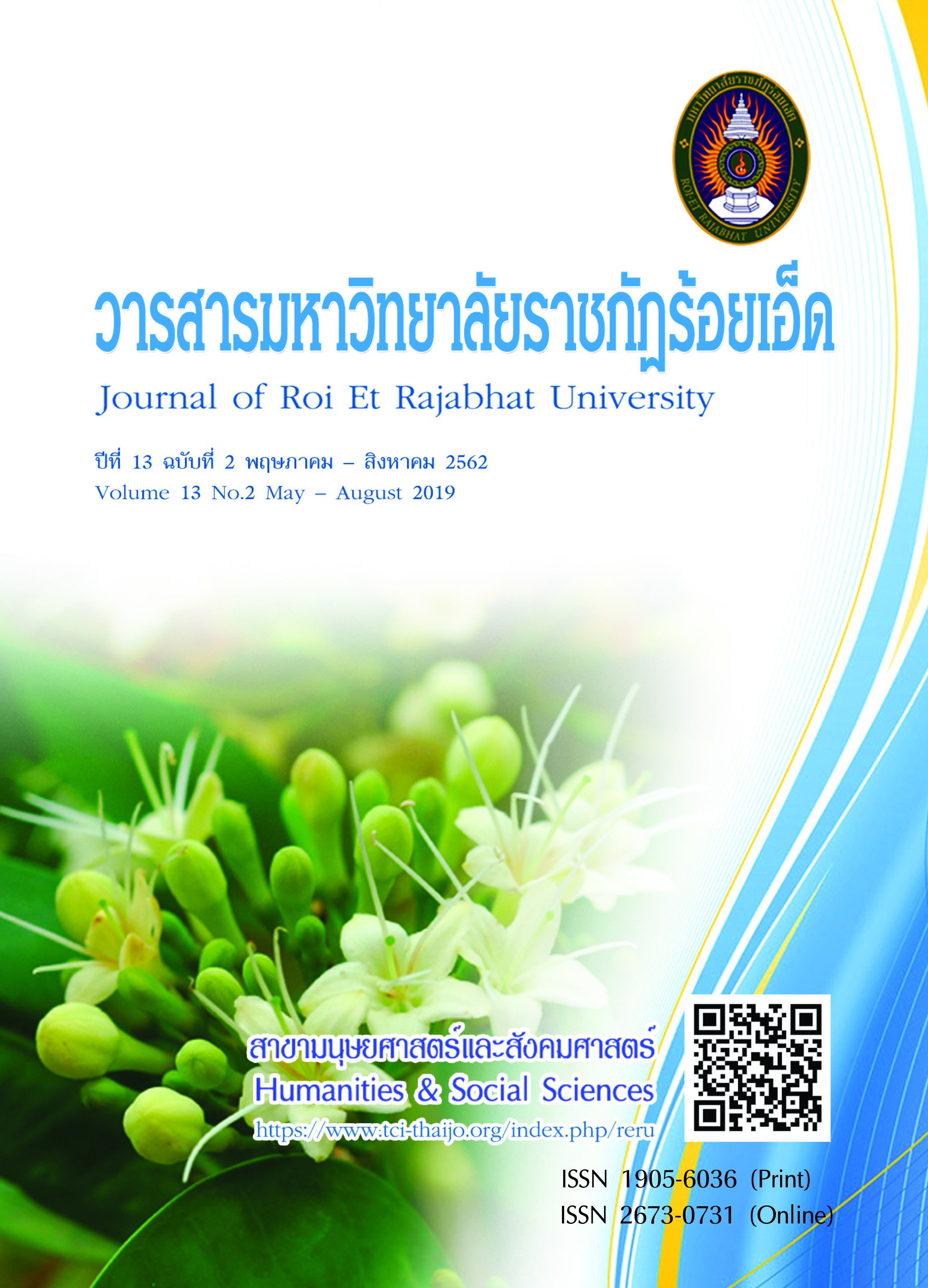The Role of School Administrators in Promoting Learners’ Characteristics in the 21st Century, under The Office of Kalasin Primary Educational Service Area 3
Keywords:
The role of school administrators, Promoting learners’ characteristics, 21st centuryAbstract
This research aims to 1) study the role level’s elements of school administrators for promoting learners' characteristics in the 21st century 2) study the role level of school administrators for promoting learners' characteristics in the 21st century and 3) compare the role level of school for promoting learners' characteristics in the 21st century in the schools with different sizes, the Office of Kalasin Primary Educational Service Area 3 by using mixed-methods educational research, exploratory design. Developing research instrument divided into 2 phases: phase 1: exploration element, study the role elements by interviewing the 7 experts and analyzing qualitative data for developing instrument in phase 2 and phase 2: study the role levels of the school administrators in promoting learners' characteristics in the 21st century. The samples were 132 school administrators and 341 teachers those selected by using stratified sampling from 199 school administrators and 2,316 teachers. Research instrument for collecting data was questionnaire that its reliability was .99 The results of this research found that: 1.The elements of school administrators’ role in promoting learners’ characteristics in the 21st century consisted of 5 aspects as:: 1) Planning, 2) Participative Administration, 3) Environmental Management to enhance learning, 4) Supervision, Monitoring and Evaluation, and 5) Academic Leadership. 2. The role levels of school administrators, in overall, was at high level ( xˉ ) = 4.13 S.D. = 0.579). When considering in each aspect was also at high level. The aspect of Environmental Management to enhance learning was at highest level and the aspect of Supervision, Monitoring and Evaluation was at lowest level. 3. The role levels of school in different size schools in promoting learners’ characteristics in 21st century were significantly different at the statistical level of .05.
References
กรุงเทพฯ: องค์การรับส่งสินค้าและพัสดุภัณฑ์ (ร.ส.ท.)
ชฎากาญจน์ เจริญชนม์. (2553). ภาวะผู้นำทางวิชาการที่มีผลต่อประสิทธิผลของโรงเรียนสังกัดสำนักงานเขตพื้นที่การศึกษา
ขอนแก่น เขต 1. รายงานการศึกษาอิสระ ศึกษาศาสตรมหาบัณฑิต สาขาวิชาการบริหารการศึกษา. ขอนแก่น:
มหาวิทยาลัยขอนแก่น.
ธีระ รูญเจริญ. (2545). ผู้บริหารสถานศึกษามืออาชีพ : ศักยภาพเพื่อการปฏิรูปการเรียนรู้. กรุงเทพฯ: เยล โล่การพิมพ์.
ธีระ รูญเจริญ. (2550). ความเป็นมืออาชีพในการจัดและบริหารการศึกษายุคปฏิรูปการศึกษา (พิมพ์ครั้งที่ 4). กรุงเทพฯ:
ข้าวฟ่าง.
บุญชม ศรีสะอาด. (2545). วิธีการทางสถิติสำหรับการวิจัย (พิมพ์ครั้งที่ 6) กรุงเทพฯ: สุวีริยาสาส์น.
ภัณฑ์รักษ์ พลตื้อ. (2558). ผู้อำนวยการสำนักงานเขตพื้นที่การศึกษาประถมศึกษากาฬสินธุ์ เขต 3. (27 สิงหาคม) สัมภาษณ์.
วิจารณ์ พานิช. (2556). การสร้างการเรียนรู้สู่ศตวรรษที่ 21. กรุงเทพฯ: มูลนิธิสยามกัมมาจล.
สมชาย เทพแสง. (2552). ปัจจัยส่วนบุคคลและปัจจัยการบริหารจัดการที่ส่งผลต่อภาวะผู้นำกลยุทธ์ของผู้บริหารโรงเรียนใน
โรงเรียนของจังหวัดภาคเหนือตอนบน”. วารสารบริหารการศึกษามหาวิทยาลัยศรีนครินทรวิโรต, 6(11), 83.
สมชาย อ่ำดอนกลอย. (2556). บทบาทผู้บริหารสถานศึกษาในศตวรรษที่ 21. วารสารวิชาการบัณฑิตศึกษามหาวิทยาลัย
พิบูลสงคราม, 7(1), 1-7.
สำนักงานคณะกรรมการการศึกษาขั้นพื้นฐาน. (2558). หลักสูตรพัฒนาข้าราชการครูและบุคลากรทางการศึกษาก่อนแต่งตั้ง
ให้ดำรงตำแหน่งผู้อำนวยการสถานศึกษา. สืบค้นเมื่อ 15 กุมภาพันธ์ 2561,
จาก https://www1.obec.go.th/sites/obec.go.th/files/document/attachment/6996/59331.pdf
สำนักงานคณะกรรมการการประถมศึกษาแห่งชาติ. (2544). พัฒนาการของคุณภาพนักเรียนประถมศึกษาและแนวทาง
การประเมิน. กรุงเทพฯ: โรงพิมพ์การศาสนา.
อนุชิต วรรณสุทธิ์. (2546). คุณลักษณะผู้บริหารสถานศึกษามืออาชีพในอนาคตสังกัด กระทรวงศึกษาธิการ. วิทยานิพนธ์
ครุศาสตรมหาบัณฑิต สาขาวิชาการบริหารการศึกษา. บุรีรัมย์: มหาวิทยาลัยราชภัฏบุรีรัมย์.
Drucker, P. (2002). Managing in The next Society. London: McGraw – Hill.
Downloads
Published
How to Cite
Issue
Section
License
บทความที่ได้รับการตีพิมพ์เป็นลิขสิทธิ์ของวารสารมหาวิทยาลัยราชภัฎร้อยเอ็ด
ข้อความที่ปรากฏในบทความแต่ละเรื่องในวารสารวิชาการเล่มนี้เป็นความคิดเห็นส่วนตัวของผู้เขียนแต่ละท่านไม่เกี่ยวข้องกับมหาวิทยาลัยราชภัฎร้อยเอ็ด และคณาจารย์ท่านอื่นๆในมหาวิทยาลัยฯ แต่อย่างใด ความรับผิดชอบองค์ประกอบทั้งหมดของบทความแต่ละเรื่องเป็นของผู้เขียนแต่ละท่าน หากมีความผิดพลาดใดๆ ผู้เขียนแต่ละท่านจะรับผิดชอบบทความของตนเองแต่ผู้เดียว





